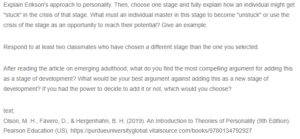Personality Development
The central concept behind Erik Erikson’s theory of personality development is that a person’s personality progresses in a prearranged order from infancy to eight stages. The first stage starts from birth to one and a half years, all the way up to adulthood, while the last stage begins from 65 years onwards. Accordingly, the stages from the first one to the last one are as follows: trust vs. mistrust, autonomy vs. shame, initiative vs. guilt, industry vs. inferiority, identity vs. role confusion, intimacy vs. isolation, generativity vs. stagnation, and lastly, ego integrity vs. despair (Svetina, 2014). Subsequently, in each stage, an individual goes through a crisis that can positively or negatively affect the individual’s personality development. Additionally, if each stage is completed successfully, then the individual is said to have a healthy personality. However, the failure to complete one of the stages can bring about a reduced ability to complete the following stages, leading to the development of an unhealthy personality (Maree, 2021). Nevertheless, Erikson argues that these failures can be resolved later, enabling one to acquire a healthy personality.
Do you need an original copy of the “Personality Development” ? Get in touch with us.
One stage that a person might get stuck in is the fifth stage, identity vs. role confusion, which occurs in one’s teenage years. A person’s identity is profoundly influenced by ego identity, which is continually influenced by our experiences and interactions. As we have numerous experiences and interactions, the ego identity changes, which can lead to confusion in one’s search for identity, leading to a weak sense of self, leaving one stuck in this stage. One way to overcome this feeling of being stuck is through proper encouragement and fortification through personal exploration. The most compelling argument on why the fifth stage should be a new stage of development is because identity is all about one’s values, ideals, and beliefs that help guide and shape one’s behavior, for example, whether the individual is resilient or not. If one has a strong sense of identity, one knows one’s strengths and weaknesses, and one has high self-esteem, all of which point to a resilient character. As opposed to adding this stage as a new stage of development, I would argue that one’s identity never stops developing because one is constantly exposed to new experiences in one’s lifetime, which further develops one’s identity. Therefore, if I had the power over whether to add this stage or not, I would make it a part of every other stage, more of a continuous stage, because, as stated above, I believe our identity never stops developing.
References
Maree, J. G. (2021). The psychosocial development theory of Erik Erikson: a critical overview. Early Child Development and Care, 191(7-8), 1107-1121.
Svetina, M. (2014). Resilience in the context of Erikson’s theory of human development. Current Psychology, 33(3), 393-404.
ORDER A PLAGIARISM-FREE PAPER HERE
We’ll write everything from scratch
Question
Explain Erikson’s approach to personality. Then, choose one stage and thoroughly explain how an individual might get “stuck” in the crisis of that stage. What must an individual master in this stage to become “unstuck” or use the crisis of the stage as an opportunity to reach their potential? Give an example.

Personality Development
Respond to at least two classmates who have chosen a different stage than the one you selected.
After reading the article on emerging adulthood, what do you find the most compelling argument for adding this as a stage of development? What would be your best argument against adding this as a new stage of development? If you had the power to decide to add it or not, which would you choose?
text;
Olson, M. H., Favero, D., & Hergenhahn, B. H. (2019). An Introduction to Theories of Personality (9th Edition). Pearson Education (US). https://purdueuniversityglobal.vitalsource.com/books/9780134792927


